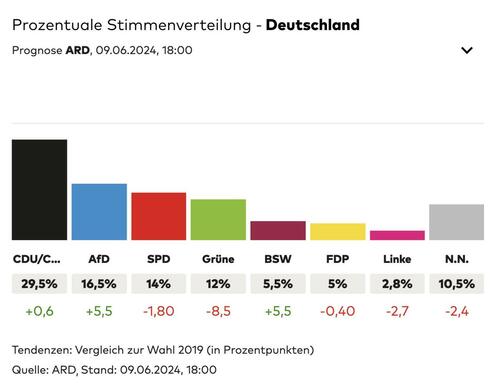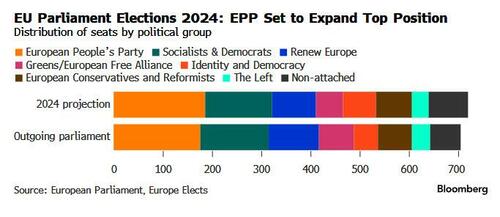As we await the results from the European Parliament vote (previewed here), the exit polls from Germany are already in and they are a disaster for German Chancellor Olaf Scholz’s Social Democrats which crashed to their worst-ever result in European Parliament elections Sunday, while conservative and nationalist parties soared, a result which will help tilt the European parliament further towards a more anti-immigration and anti-green stance.
According to preliminary results from five countries, right-wing parties are estimated to have won at least 33 of the 174 seats available in Austria, Cyprus, Germany, Greece and the Netherlands, according to official exit polls from those countries, up from 19 seats at the last election in 2019. And - as the ultraliberal FT admits - "the surge, at the expense of liberal and Green parties, would complicate European commission president Ursula von der Leyen’s bid for a second term as head of the EU’s executive."
In Germany, Chancellor Scholz’s Social Democrats crashed to their worst-ever result, falling to third place with 14% of the vote behind the populist and nationalist Alternative for Germany, which has become the second-largest German party in the European Parliament with 16.4%. The conservative CDU/CSU alliance was on course for a comfortable win with 29.6%, according to an exit poll Sunday from public broadcaster ARD. The other two parties in Scholz’s ruling alliance — the Greens and the Free Democrats — got 12% and 5% respectively.
As reported overnight, the German exit polls are among the first results from the European election, which started Thursday and culminates Sunday, and will determine the make-up of the bloc’s legislative assembly. The outcome will establish which leaders have the most leverage to claim the EU’s top jobs, including the presidents of the European Commission and the European Council.
The catastrophic showing for Scholz’s coalition underscores the increasing difficulty the German government faces in leading European policy. Support for Scholz’s ruling alliance in Berlin has dropped to record lows in recent months, with the three parties’ combined support currently around 35%, down from more than 50% in the 2021 federal election.
As Bloomberg reports, CDU General Secretary Carsten Linnemann questioned whether Scholz retains the authority to lead the country and blamed the ruling coalition’s policies for the rise of the AfD. “He was the one on the election posters so really he should submit to a vote of confidence,” Linnemann said.
The AfD managed to post substantial gains despite experiencing a series of setbacks in recent weeks involving bribery and spying scandals. The Alliance Sahra Wagenknecht, or BSW, which she co-founded in January after splitting from the Left party, got 5.7%.
Kevin Kuehnert, the SPD general secretary, said the party won’t be seeking “scapegoats” and insisted that it had been the right decision to make Scholz a central figure in the election campaign despite his relatively low approval rating.
“For us this is an extremely bitter result,” Kuehnert said in an interview with ARD. “We will have to look at where we weren’t good in our mobilization,” he added. “The promise now is that we’ll fight back from this.”
Kuehnert said the priority for the coalition in coming weeks is to broker an agreement on next year’s budget, which has been another source of infighting in the three-party alliance.
Amid continued losses for the establishment, right-wing and conservative parties in Europe are slated to pick up more seats compared with the last election five years ago, as migration swings to the top of the political agenda, while the EU’s ambitious climate goals may face greater hurdles.
Still, at the EU level, centrist parties on the left and right are due to maintain their grip on the majority. That means a degree of continuity on key policies at a time of immense geopolitical uncertainty with Russia’s war on Ukraine raging to the east and China becoming ever more assertive.
As further discussed overnight, the EU is also confronting challenges including how to maintain fiscal sustainability while investing in a greener future, boosting the competitiveness of European manufacturing and strengthening defense capabilities amid the prospect of Donald Trump’s return to the US presidency, which could impact everything from trade to environment policy.
Germany’s next national vote is due in the fall of next year. The ruling parties are expected to fare just as poorly in their next major electoral test — three regional ballots in September in the eastern states of Thuringia, Saxony and Brandenburg with the AfD is leading in the polls in the three states, but is unlikely to get into government as all other parties have ruled out joining it in coalition.
In the Netherlands, Dutch conservative Geert Wilders notched significant gains on Thursday, though fell short of winning the most Dutch seats in the European Parliament. That victory was claimed by a coalition of left-wing parties.
In perhaps the biggest shock of all, however, the French right-wing has inflicted a staggering defeat on the Macron alliance: with Le Pen's gathering 32-33% of the vote to Macron group's 15% according to pollsters.
About 360 million people are eligible to vote for the 720 lawmakers who will serve in the EU assembly for the next five years, 96 of them from Germany. A majority of the 27 member nations are holding their ballots on Sunday, with results due to trickle in throughout the evening. Results from France are due after 8 p.m. local time.

